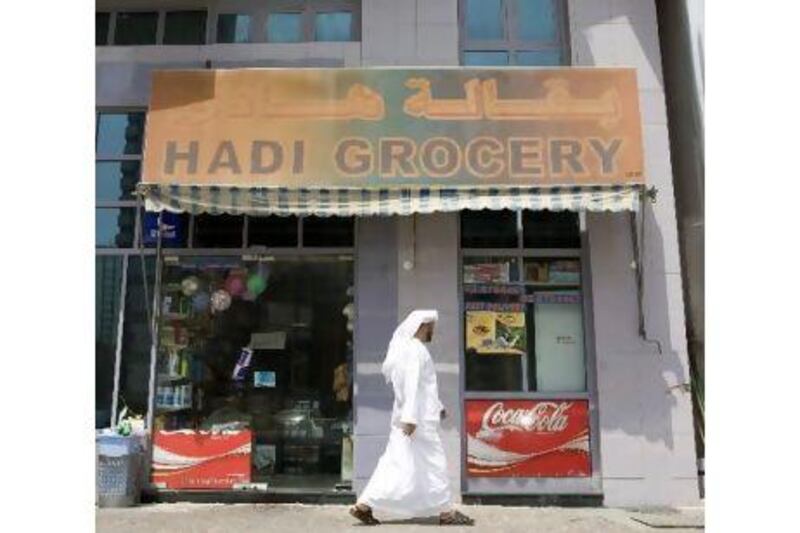Despite the abundance of hypermarkets scattered around the capital, young Emiratis still prefer the small, clutteredgrocery stores for daily necessities such as bread, drinks and phone credit.
Many attribute their preferences for these stores, known as "dekkans", which means "shops", to nostalgia and childhood memories, close proximity, home delivery options and the range of unique products.
A recent study by the Abu Dhabi Government found there were more than 1,300 small grocery stores in Abu Dhabi, opening for an average of 16 hours a day, where consumers spend about Dh1 billion (US$272.2 million) a year.
"Dekkans are integral part of our culture. They [were] there before the arrival of large stores. They mean to me what Kwik-E-Mart means to Homer Simpson," says Sultan al Darmaki, 28, an Emirati risk analyst.
For young Emiratis, dekkans provide a convenient shopping option. They offer home delivery, and many will extend credit.
"The dekkan is just a phone call away, and anything that I need to get fast would arrive on a bike five minutes later," says Saoud Essa, 24, an Emirati financial analyst.
Helal Ahmed,21, an Emirati student from Al Ain prefers going to the dekkan instead of a supermarket. "The owner of the dekkan knows me, and he comes to my car the minute he spots me, and he knows what I want," he says.
Mr al Darmaki uses the dekkan for smaller purchases such as snack and sweets, drinks, pens and batteries and last-minute gifts for those whose birthdays he forgets. "No lines, no crowd, no wasting resources by making pamphlets, much friendlier employees and they can deliver to your car," he says.
"The dekkan offers chocolate and candy products that are not available in larger stores, the kind we used to have when we were kids. They also sell old fashioned toys that add a retro look to the dekkan," he adds.
Mohammed Shareek, the owner of a grocery store located next to a private school on Airport Road, serves more than 30 students every day when they finish classes, residents in the same building and others who live nearby.
"I don't feel threatened by large hypermarkets. I have been here for years, and my store's the closest option for after-school candy and chips," laughs Mr Shareek. Bread, water, juices, chocolate and phone credit are the top products requested by customers at his store.
The capital's small grocery stores are set to be developed as part of an initiative plan by the Abu Dhabi Food Control Authority. The plan is in line with Abu Dhabi's 2030 vision and is designed to bring in internationally accepted food safety procedures determining how grocery stores are operated.
Mr Shareek welcomes the initiative. "Development is always good. I'm only afraid they will ask me to move to a bigger store, which is going to cost me a lot in rent," he says.
Improved lighting, air conditioning and storage procedures, are key factors young Emiratis want taken into consideration as part of the initiative.
"Dekkans are usually not lit or cooled properly. They are also congested and you feel that everything might fall on your head any minute you're in there. I think better displays and design would definitely improve the customer's experience," says Mr Essa.
More care should be given to the handling and storage of fresh products such as fruit and vegetables, and more attention paid to product expiry dates; dekkan employees should also be more hygienic, suggests Mr al Darmaki.
Although the development initiative is welcomed by most, some Emiratis are concerned that the traditional look of the dekkan will be lost.
Each dekkan's different feel is what makes them special, says Mr al Darmaki. "Each dekkan has its own unique charm, better than having monotonous franchises," he adds.
Mr Ahmed agrees. "I hope the initiative won't change the look and feel of the dekkans so they all look generic like the 7-Eleven convenience stores. [Dekkans are] part of our culture and heritage and should be kept the same."
Manar al Hinai is a graduate of the University of Leeds and has her daily dose of chocolate and crisps delivered to her home by her local dekkan





